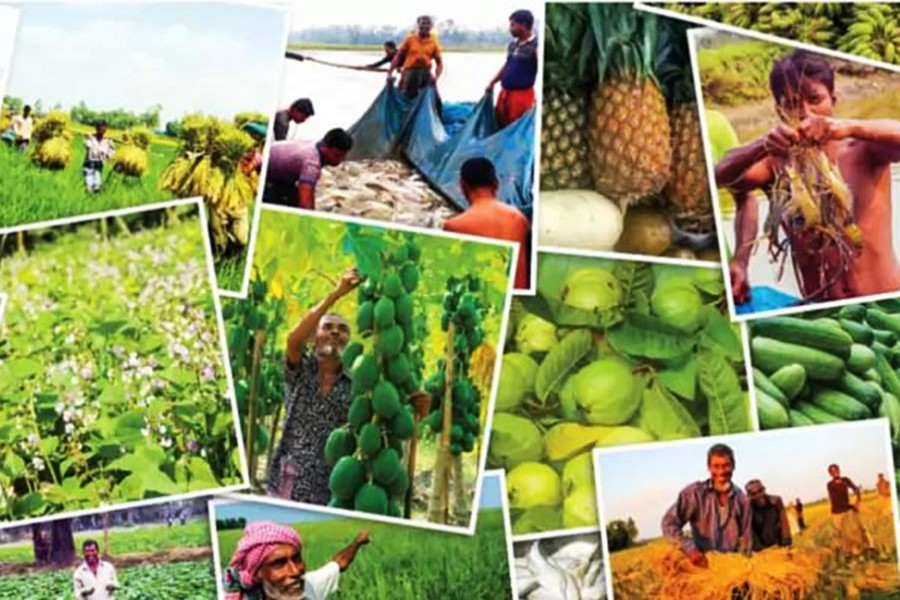
Published :
Updated :

Agro-processed foods with the essential marker of value addition are considered to have brighter prospect than many other processed products because of their growing demand globally. Bangladesh, a country firmly positioned for its myriad varieties of agricultural products should for all valid reasons be a formidable contender to produce substantial quantities of agro-processed foods for both local consumption as well as exports. Although exporting is altogether a different proposition, shying away from accessing overseas markets up to the potential does not at all validate the country's commendable growth in agricultural produce over the decades.
True, the country's food processing industry has over the years grown fairly well catering mostly to increasing domestic demand while also engaging in overseas marketing-albeit in a small way. What actually stands in the industry's flourishing, especially on the export front, is inadequate lab testing facilities as well as lack of facilities to maintain compliance norms of the destination markets. While lab testing is the only means to ensuring quality compliance of most products, it is crucial in respect of food products. Unless food items meant for export are channelled through proper laboratory tests in line with internationally recognised protocols, Bangladesh's export market of agro-processed foods would continue to remain untapped despite high potential. This is more pronounced these days than in the past as the destination markets, especially those in the developed countries, are resorting to trade barriers through stricter non-tariff measures on standards relating to, among others, sanitary and phyto-sanitary aspects.
There is no point harping on the issue. Agro-processors know it well, and have been suffering due to this while exporting. However, not all overseas markets are equally sensitive, but most importing countries go by standard procedures with strict compliance requirements. The country's agro-processors have been urging the government to establish a quality control lab of international standard where processed food items will be tested in order to obtain better branding in the world market. The issue, in fact, is more than branding because unless products are able to access prospective markets, the question of branding is a far cry. More importantly, if an importing country comes up with an embargo owing to deficient quality control, the fallout would take its toll on the entire industry.
Experts blame low investment in the sector as a key hindering factor. Besides, they say due to unplanned setting of processing plants, agricultural products grown in different parts of the country cannot be mobilised into the processing industry. The country has more than 400 food processing firms but only a dozen of them are in exporting, and of these, one or two dominate as market leaders-though with a moderate export volume. Import dependence on packaging materials, lack of appropriate quality control mechanism and absence of a nodal agency to monitor and supervise the activities of the sector are the main challenges to be overcome for tapping its actual potential.
These and other related issues were recently highlighted at a virtual event titled "Economic Tie of Bangladesh and Europe: New Regulatory Regime". Speakers at the event also stressed the need for agro mechanisation, automation and investment in research and development. In this context, noting the viability of EU investment in Bangladesh in these areas, they opined that low wage, semi-skilled and skilled labour, congenial investment climate are the strong points that could benefit EU investors. Investors from the EU countries can find it highly lucrative to produce goods here and export to the EU markets and fetch the EU GSP-plus benefit. In this connection, the Commerce Minister who chaired the event said that in the draft of the new EU GSP regulation, the European Union has proposed to remove the import-share criterion from the GSP+ eligibility. Bangladesh will be the direct beneficiary of this change, he added. This indeed applies to all manufactured products. However, according to experts, investing in agro-food processing in Bangladesh looks highly prospective.
Currently, although Bangladeshi processed foods are being exported to many countries ranging from the advanced to less advanced regions, the key markets, because of the concentration of migrant population, are the United Kingdom, the USA, Canada, Malaysia and countries in the Middle Eastern region. But reaching out to wider consumer groups demands that food products, especially those processed, must come to terms with the compliance requirements of respective countries. The EU being such a destination asks for fulfilment of its stringent compliance requirements. And to access markets like the EU, quality assurance would allow besides accessing the markets, the opportunity of diversifying the product range.
In this context, the issue of accredited labs may also be found pertinent. Human, technical and logistic resources may not always be enough to assure exporters of entry of their products into the target markets. What is important here is compatibility that can be ensured through accredited agencies, authorised to conduct tests as per strictly followed and monitored guidelines.


 For all latest news, follow The Financial Express Google News channel.
For all latest news, follow The Financial Express Google News channel.